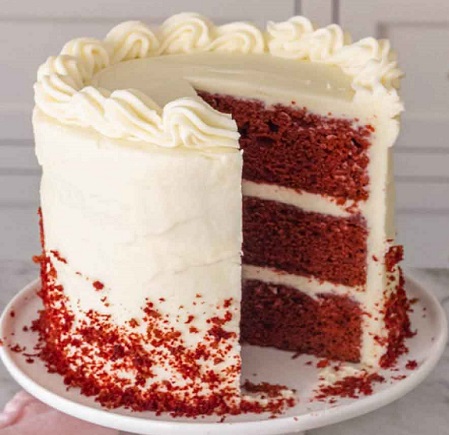Red Velvet Cake Recipe
Red Velvet Cake is a dessert that captivates both the eye and the palate. With its striking crimson hue and velvety texture, this cake has become an iconic treat, beloved for its unique flavor profile that balances subtle cocoa notes with a tangy cream cheese frosting.
Originating in the American South, Red Velvet Cake has a rich history that dates back to the 19th century, evolving from a simple cocoa-based cake to the vibrant dessert we know today.
The charm of Red Velvet Cake lies not just in its appearance, but in its complex flavor. It’s not quite chocolate, not quite vanilla, but a delightful harmony of both, with a hint of tanginess from buttermilk and vinegar.
The cake’s texture is incredibly moist and tender, thanks to the chemical reaction between these acidic ingredients and the baking soda, which also contributes to its signature reddish color (enhanced by food coloring in modern recipes).
This recipe has been carefully crafted to achieve the perfect balance of flavors and textures that define a classic Red Velvet Cake. The cake layers are soft and moist, with a fine crumb that truly deserves the name “velvet.” The cream cheese frosting provides a creamy, tangy contrast that complements the cake beautifully.
As we embark on this baking journey, remember that precision is key. Each ingredient plays a crucial role in creating the distinctive Red Velvet flavor and texture. So, gather your ingredients, preheat your oven, and let’s create a Red Velvet Cake that will dazzle your guests and satisfy your sweet tooth.
Ingredients:
For the Cake:
- 2 1/2 cups (310g) all-purpose flour
- 1 1/2 cups (300g) granulated sugar
- 1 teaspoon baking soda
- 1 teaspoon salt
- 2 tablespoons (10g) unsweetened cocoa powder
- 1 1/2 cups (350ml) vegetable oil
- 1 cup (240ml) buttermilk, room temperature
- 2 large eggs, room temperature
- 2 tablespoons (30ml) red food coloring
- 1 teaspoon white vinegar
- 1 teaspoon vanilla extract
For the Cream Cheese Frosting:
- 16 oz (450g) cream cheese, softened
- 1/2 cup (115g) unsalted butter, softened
- 4 cups (480g) powdered sugar
- 1 teaspoon vanilla extract
- Pinch of salt
How to Make:
Prepare the Oven and Pans:
Preheat your oven to 350°F (175°C). Grease and flour two 9-inch round cake pans, or line them with parchment paper.
Mix Dry Ingredients:
In a medium bowl, whisk together the flour, sugar, baking soda, salt, and cocoa powder until well combined.
Combine Wet Ingredients:
In a large bowl or stand mixer, beat together the vegetable oil, buttermilk, eggs, red food coloring, vinegar, and vanilla extract until well combined.
Mix Batter:
Gradually add the dry ingredients to the wet ingredients, mixing on medium speed until just combined. Be careful not to overmix.
Bake:
Divide the batter evenly between the prepared pans. Bake for 30-35 minutes, or until a toothpick inserted into the center comes out clean.
Cool:
Allow the cakes to cool in the pans for 10 minutes, then turn out onto a wire rack to cool completely.
Prepare the Frosting:
In a large bowl or stand mixer, beat the cream cheese and butter until smooth and creamy. Gradually add the powdered sugar, mixing on low speed until incorporated. Add the vanilla extract and salt, then beat on medium-high speed until light and fluffy.
Assemble and Frost:
Once the cakes are completely cool, place one layer on a cake stand or serving plate. Spread a generous layer of frosting on top. Place the second layer on top and frost the entire cake with the remaining frosting.
Chill:
Refrigerate the frosted cake for at least an hour before serving to allow the frosting to set.
Chef’s Notes:
Quality Ingredients: Use high-quality cocoa powder and pure vanilla extract for the best flavor.
Room Temperature Ingredients: Ensure your eggs and buttermilk are at room temperature for better incorporation into the batter.
Food Coloring: For a vibrant red color, gel food coloring works best. If using liquid food coloring, you may need to adjust the amount.
Don’t Overmix: Mix the batter just until the ingredients are combined. Overmixing can lead to a tough cake.
Cake Flour Option: For an even more tender crumb, you can replace 1/2 cup of the all-purpose flour with cake flour.
Natural Red Color: If you prefer to avoid artificial food coloring, you can experiment with natural alternatives like beet powder, although this will affect the flavor slightly.
Frosting Consistency: If the frosting is too soft, chill it for 15-20 minutes before frosting the cake. If it’s too firm, let it sit at room temperature for a few minutes.
Decoration: Consider garnishing the cake with cake crumbs, chocolate shavings, or fresh berries for an extra special touch.
Storage: Store the frosted cake in an airtight container in the refrigerator for up to 5 days. Bring to room temperature before serving for the best flavor and texture.
Freezing: Unfrosted cake layers can be wrapped tightly and frozen for up to 3 months. Thaw overnight in the refrigerator before frosting and serving.
Nutritional Value (per serving, assuming 12 servings):
Please note that these values are approximate and can vary based on specific ingredients and portion sizes.
- Calories: 750
- Total Fat: 47g
- Saturated Fat: 15g
- Cholesterol: 85mg
- Sodium: 400mg
- Total Carbohydrates: 80g
- Dietary Fiber: 1g
- Sugars: 63g
- Protein: 6g
Red Velvet Cake is undoubtedly an indulgent dessert, high in calories, sugar, and fat. The majority of its calories come from the vegetable oil in the cake and the cream cheese and butter in the frosting.
While it’s not a health food by any means, it does offer some nutritional elements when enjoyed in moderation as part of a balanced diet.
The cake contains small amounts of protein from the eggs and milk products. The cream cheese frosting provides calcium, which is important for bone health. The cocoa powder, although used in small amounts, contains antioxidants and minerals like iron and magnesium.
However, due to its high sugar and fat content, this dessert should be considered an occasional treat rather than a regular part of one’s diet. Those watching their calorie or sugar intake might consider smaller portion sizes or reducing the amount of frosting used.
For individuals with dietary restrictions, this recipe can be adapted:
For a gluten-free version, replace the all-purpose flour with a gluten-free all-purpose flour blend.
For a dairy-free cake, substitute the buttermilk with a non-dairy milk mixed with a tablespoon of vinegar. The frosting can be made with dairy-free cream cheese and butter alternatives, though this will alter the flavor and texture.
For those avoiding artificial food coloring, natural alternatives like beet powder can be used, although this will affect both the color and flavor of the cake.
It’s important to note that any substitutions will affect both the flavor and the nutritional profile of the final product.
Remember, the joy of baking and sharing a homemade cake extends beyond its nutritional value. The process of creating something beautiful and delicious, and the pleasure of sharing it with others, can have positive emotional and social benefits. Enjoy your Red Velvet Cake mindfully, savor each bite, and relish the special moments it helps create.
In conclusion, this Red Velvet Cake recipe offers a classic take on a beloved dessert. Its striking appearance and unique flavor make it perfect for special occasions or when you want to add a touch of elegance to your dessert table.
While it’s not an everyday indulgence, its rich flavor and velvety texture make it a memorable treat that’s worth the occasional splurge. Bake with care, share with love, and enjoy every vibrant, velvety moment!
Thanks for visiting Birthday Cakes Recipe

